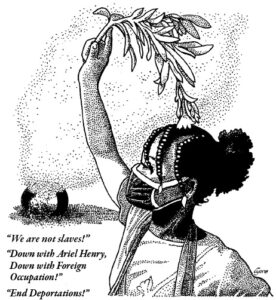
An alternative policy for Haiti in crisis

US Subsecretary of State Wendy Sherman’s April visit to Santo Domingo served to ratify the strategic character of the Dominican regime’s subordination to the US and to iron out the differences that arose during the year . . .

Simón Rodríguez Porras discusses popular mobilizations in Haiti against the current regime, and the history of imperialist interventions in Haiti.

“With this year’s worldwide renewal of the Black Lives Matter protests, readers could hardly ask for a better time to revisit the Haitian Revolution.” Review of Sudhir Hazareesingh, Black Spartacus: The Epic Life of Toussaint Louverture.

Latin America is experiencing an abrupt change generated by enormous confrontations between the dispossessed and the privileged. This confrontation includes both revolts by the people and reactions by the oppressors.
The October Revolts
The uprising in Chile is the most important event . . .

Critical developments around the globe compel the creation of a new type of transnational socialist and anti-authoritarian solidarity network.
Though these two pieces about education, one about the terrible way the US is destroying any possibilities for a real system of public education in Haiti, the other reasons the author is NOT talking about race, do not make this connection, they point to the fact that education in the US has to be seen in the context of international policy, and in particular US imperialism, in which racism is pro

From the perspective of Honduran and Honduranist scholars, the most common reference to Haiti is as a point of hemispheric comparison. Whether measuring GDP per capita, state legitimacy and citizens’ political tolerance, or corruption, the phrase “Honduras ranks last…after Haiti” seems to be de rigueur. This is no coincidence: the policies and structures that have effected extreme poverty and highly concentrated wealth in both places are very much connected.
Below is an appeal from Mark Dow for the Haitian popular radio work of New Politics writer Sony Esteus and his colleagues in the wake of Haiti’s devastating earthquake. I hope you can make a contribution, even if it is modest. Send a donation to our office, New Politics, 155 W. 72nd Street, Rm 402, NY, NY 10025 or go give through PayPal on our website www.newpol.org. As always, gifts to New Politics are tax deductible; please indicate that the donation is for Haiti. To contact Mark directly, write him at mdow@igc.org
In solidarity,
Joanne Landy, member, New Politics editorial board
I totally agree with Jesse Lemisch’s astute comments about George Clooney’s extravaganza and its conspicuous avoidance of anything that might be construed as “political.” Of course, in the midst of a colossal disaster, this feel-good spectacle of entertainment icons is inherently political, rife with intended and unintended consequences. First of all, it is hard to separate celebrity magnanimity from self-promotion.
George Clooney (currently in “Up in the Air”) organized on short notice a technically and musically fine two hour fund-raising telethon, “Hope for Haiti,” which was broadcast on January 22 on most networks, many cable channels, on the Web, and both in and beyond the US. Here are two samplers of the music: one and two.
RANDALL ROBINSON HAS WRITTEN a searing, unforgiving expose of the forcible abduction, in February, 2004, of the democratically elected president of Haiti, Jean-Bertrand Aristide, and the consequent deepening wretchedness of its citizens. But he does more than that. In just 270 pages of text, he depicts Haiti from the triumph of the slave revolution in 1804 to the installation of Rene Garcia Preval as president in May, 2006, while thousands of the dissident black population shouted their displeasure and could be heard outside the gates of the presidential palace during the inauguration.